Module1 Lost and found 知识点讲解课件2021-2022学年外研版英语七年级下册(共43张PPT)
文档属性
| 名称 | Module1 Lost and found 知识点讲解课件2021-2022学年外研版英语七年级下册(共43张PPT) | 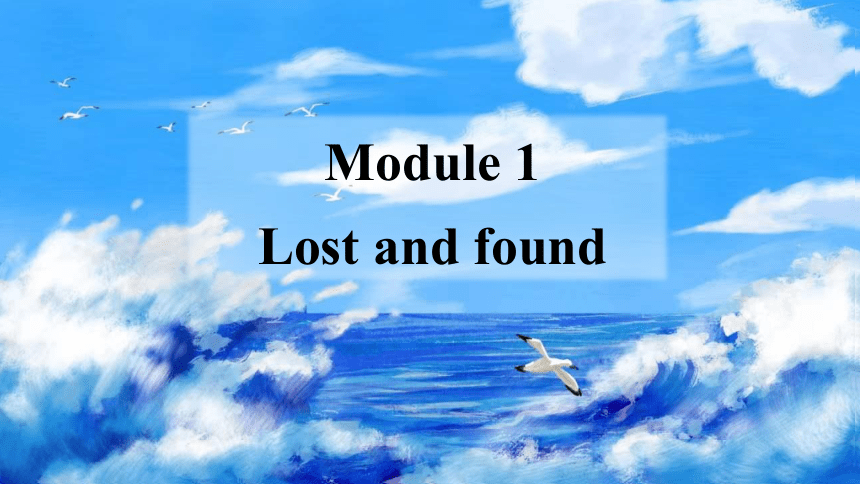 | |
| 格式 | pptx | ||
| 文件大小 | 232.5KB | ||
| 资源类型 | 教案 | ||
| 版本资源 | 外研版 | ||
| 科目 | 英语 | ||
| 更新时间 | 2022-01-06 13:40:36 | ||
图片预览


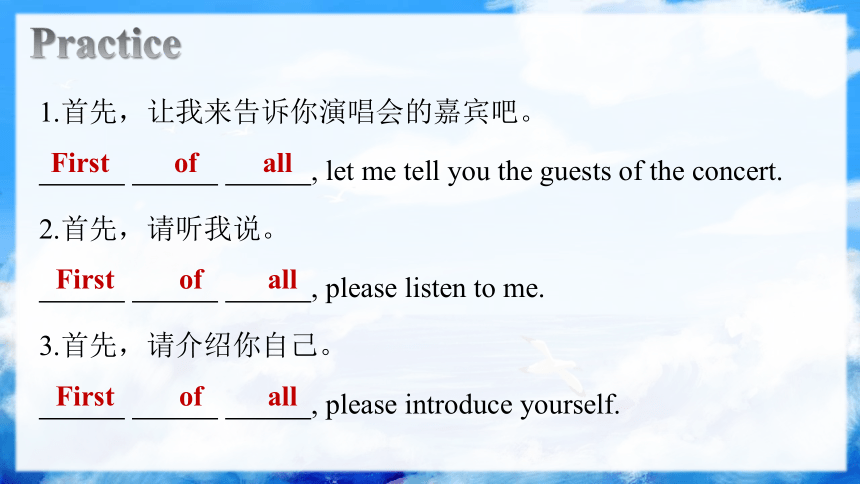
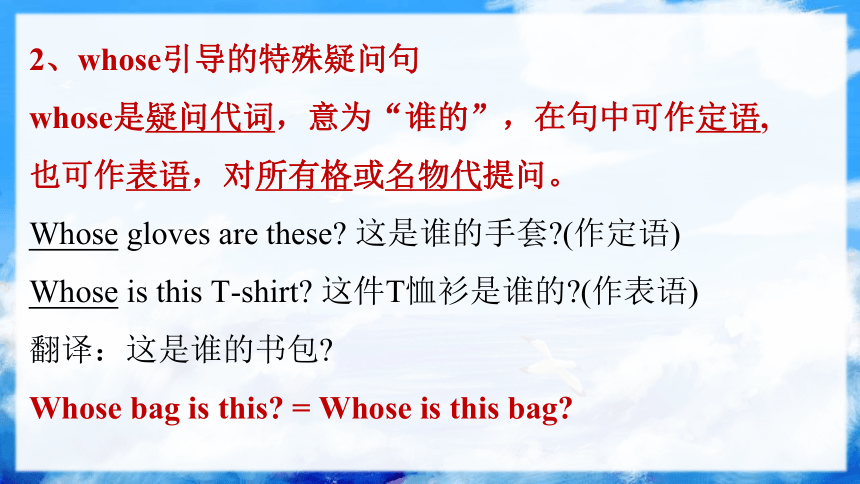
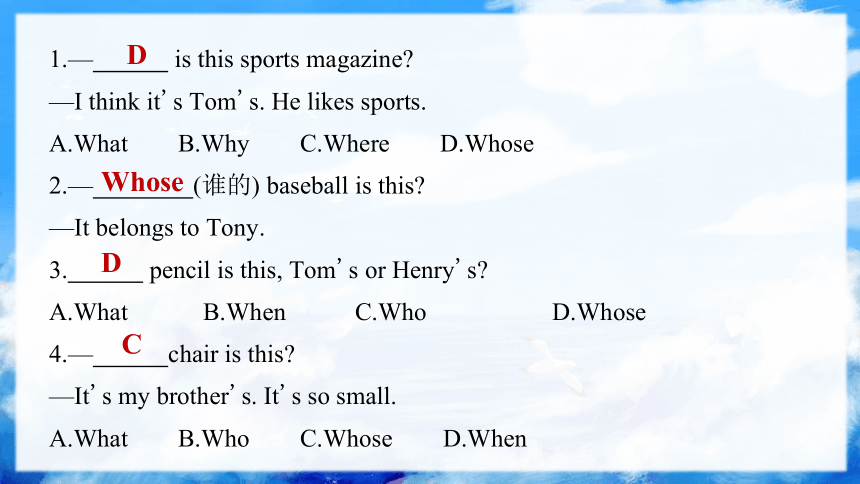
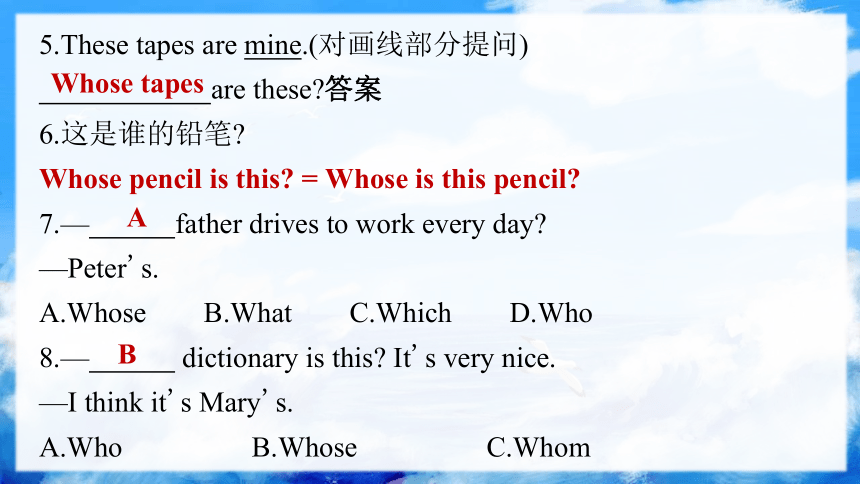
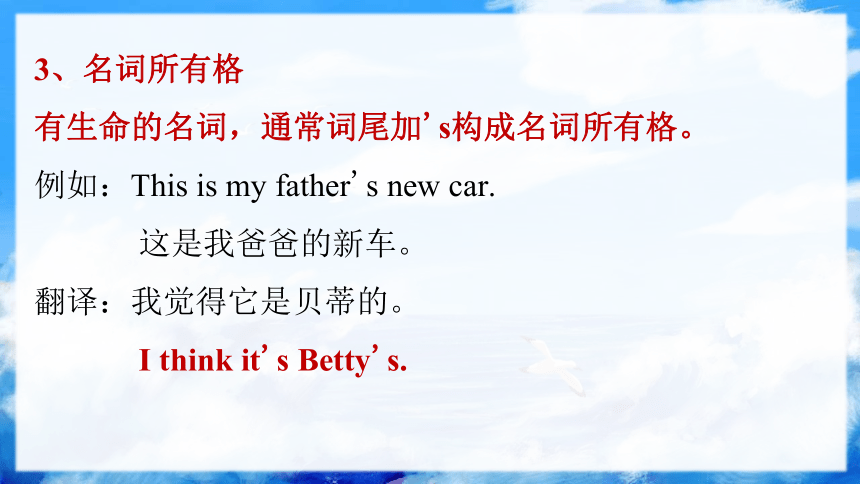
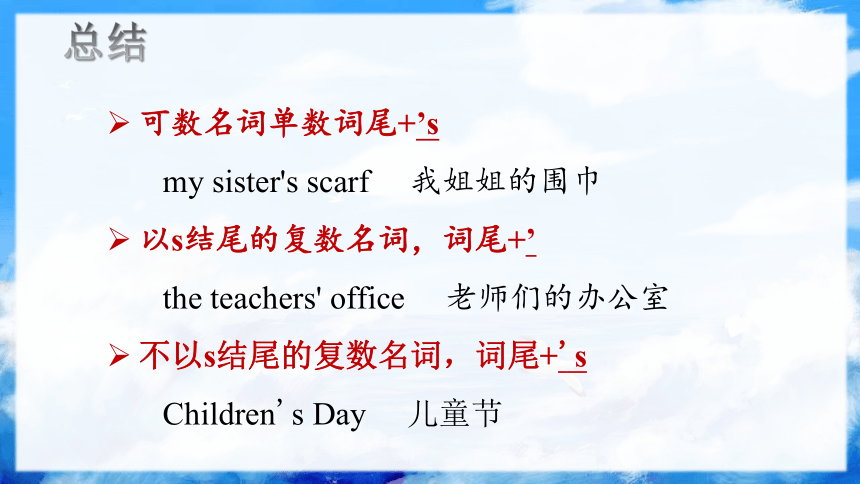
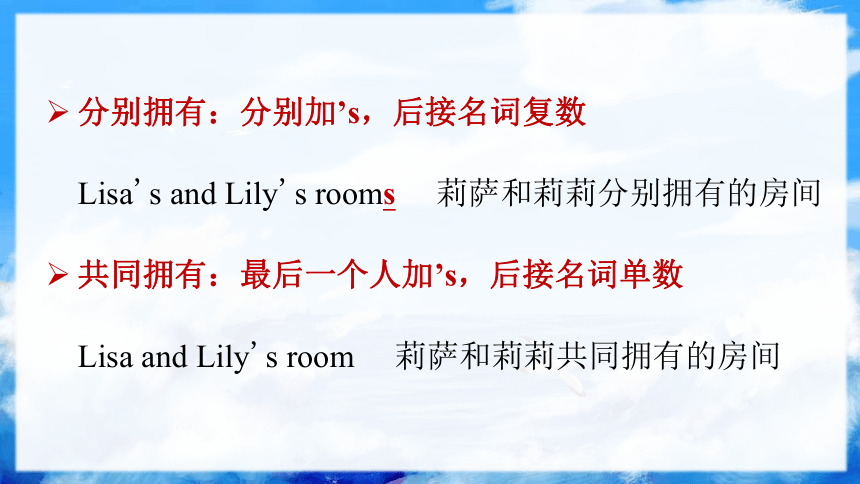
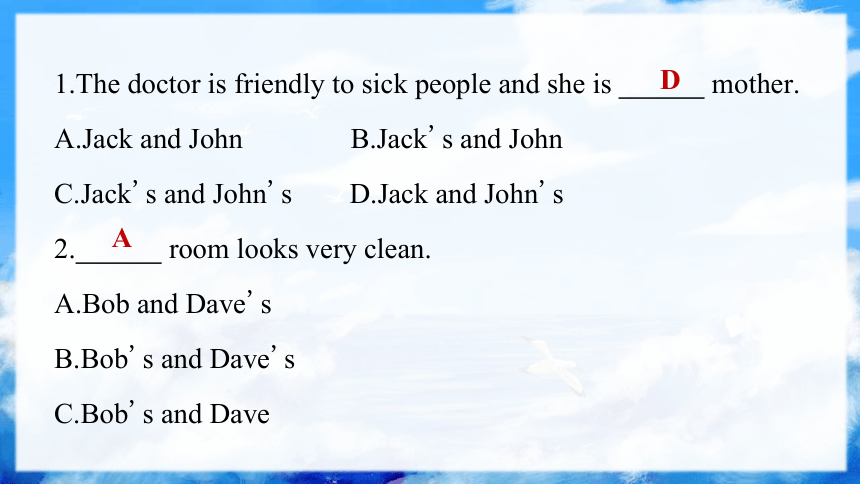
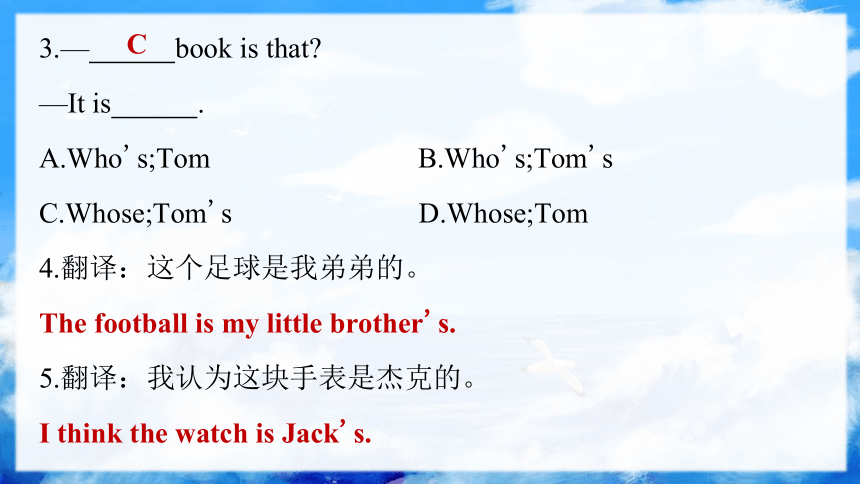
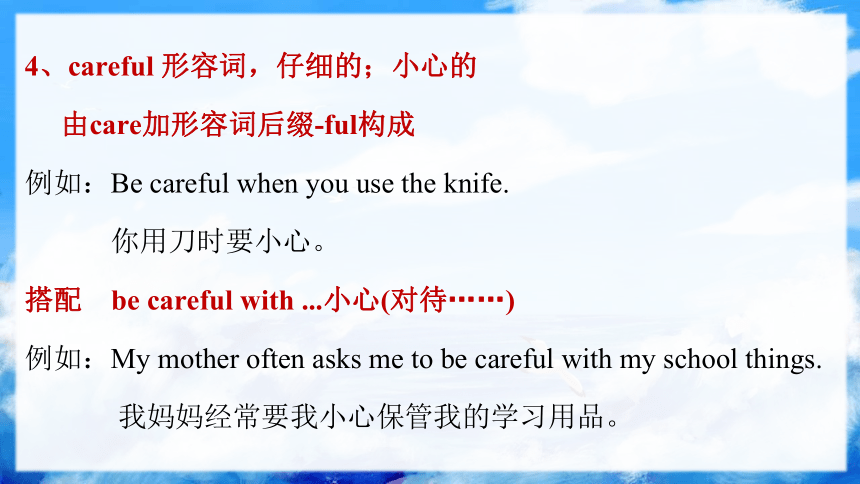
文档简介
(共43张PPT)
Module 1
Lost and found
1、 first of all 首先;第一
例如:First of all, let me tell you a piece of good news.
首先,让我告诉你一个好消息吧。
翻译:首先,过来看看失物招领箱吧!
First of all, come and look in the lost and found box!
1.首先,让我来告诉你演唱会的嘉宾吧。
, let me tell you the guests of the concert.
2.首先,请听我说。
, please listen to me.
3.首先,请介绍你自己。
, please introduce yourself.
Practice
First of all
First of all
First of all
2、whose引导的特殊疑问句
whose是疑问代词,意为“谁的”,在句中可作定语,
也可作表语,对所有格或名物代提问。
Whose gloves are these 这是谁的手套 (作定语)
Whose is this T-shirt 这件T恤衫是谁的 (作表语)
翻译:这是谁的书包
Whose bag is this = Whose is this bag
1.— is this sports magazine
—I think it's Tom's. He likes sports.
A.What B.Why C.Where D.Whose
2.— (谁的) baseball is this
—It belongs to Tony.
3. pencil is this, Tom's or Henry's
A.What B.When C.Who D.Whose
4.— chair is this
—It's my brother's. It's so small.
A.What B.Who C.Whose D.When
D
Whose
D
C
5.These tapes are mine.(对画线部分提问)
are these 答案
6.这是谁的铅笔
Whose pencil is this = Whose is this pencil
7.— father drives to work every day
—Peter's.
A.Whose B.What C.Which D.Who
8.— dictionary is this It's very nice.
—I think it's Mary's.
A.Who B.Whose C.Whom
Whose tapes
A
B
3、名词所有格
有生命的名词,通常词尾加's构成名词所有格。
例如:This is my father's new car.
这是我爸爸的新车。
翻译:我觉得它是贝蒂的。
I think it's Betty's.
总结
可数名词单数词尾+’s
my sister's scarf 我姐姐的围巾
以s结尾的复数名词,词尾+’
the teachers' office 老师们的办公室
不以s结尾的复数名词,词尾+'s
Children's Day 儿童节
分别拥有:分别加’s,后接名词复数
Lisa's and Lily's rooms 莉萨和莉莉分别拥有的房间
共同拥有:最后一个人加’s,后接名词单数
Lisa and Lily's room 莉萨和莉莉共同拥有的房间
1.The doctor is friendly to sick people and she is mother.
A.Jack and John B.Jack's and John
C.Jack's and John's D.Jack and John's
2. room looks very clean.
A.Bob and Dave's
B.Bob's and Dave's
C.Bob's and Dave
A
D
3.— book is that
—It is .
A.Who's;Tom B.Who's;Tom's
C.Whose;Tom's D.Whose;Tom
4.翻译:这个足球是我弟弟的。
The football is my little brother's.
5.翻译:我认为这块手表是杰克的。
I think the watch is Jack's.
C
4、careful 形容词,仔细的;小心的
由care加形容词后缀-ful构成
例如:Be careful when you use the knife.
你用刀时要小心。
搭配 be careful with ...小心(对待……)
例如:My mother often asks me to be careful with my school things.
我妈妈经常要我小心保管我的学习用品。
反义词:careless adj. 粗心的;马虎的
派生词:carefully adv. 小心地;仔细地
翻译:从现在开始,请每个人小心保管自己的物品。
Everyone, please be careful with your things from now on.
1.你乘坐公共汽车时要小心你的包。
Be your bag when you take a bus.
2.Be (仔细的) with your things from now on.
3.Be more next time, and you won't make the same mistake again.
A.careless B.careful C.nervous
4.My little brother is very , so he often makes mistakes.
A.careful B.careless C.care
careful with
careful
B
B
5.请小心照看你的物品。
Please your things.
6.Wang Ding is careful her computer.
A.with B.in C.at
7.Alice does her homework as as Peter.
A.carefully B.more careful C.careful
8.请大家注意保管好自己的物品。
Everyone, please be your things.
be careful with
A
A
careful with
5、when引导的时间状语从句,此时when是连词,意为“在……时候”
例如:You can call me when you are free.
你有空时可以给我打电话。
翻译:人们在旅行时或是匆匆忙忙时经常丢东西。
People often lose things when they're travelling or when
they're in a hurry.
1. you smile at others, they will smile back.
A.Before B.When C.Until D.Though
2.My grandparents wrote letters to keep in touch with others they were young.
A.when B.since C.after D.before
3.请你有空的时候给我打电话。
Please call me free.
B
A
when you are
4.A stupid man tells a woman to shut up, while a wise man tells her that her mouth is quite beautiful it is closed.
A.unless B.since C.when D.though
5.I will ask my teachers for help
I have any problem.
A.when B.where C.whose D.which
C
A
6、in a hurry 匆匆忙忙,hurry是名词,意为“匆忙”。
例如:They arrived at the railway station in a hurry.
他们匆匆忙忙赶到了火车站。
翻译:人们在旅行时或是匆匆忙忙时经常丢东西。
People often lose things when they're travelling or when
they're in a hurry.
hurry还可以作动词,意为“匆忙”。
hurry up:快点儿;赶紧
例如:Hurry up, or you will be late.
快点儿,否则你会迟到的。
1.如果你匆匆忙忙地做事情你就会犯错。
You will make mistakes if you do things .
2.He left home in a (匆忙)and forgot to turn off the light
this morning.
3.—Why are you in hurry
—My classmates are playing tennis. I want to cheer them.
A.a;/ B.an;/ C.the;the D./;the
in a hurry
hurry
A
4.他们匆匆忙忙地赶到了机场。
They arrived at the airport .
5.火车站的那些工作人员总是匆匆忙忙的。
Those workers at the train station are always a .
in a hurry
in hurry
7、look for 寻找
例如:She is looking for her keys.
她正在找她的钥匙。
辨析:look for和find
look for意为“寻找”,强调找的动作;
find意为“找到”,强调找的结果。
例如:I am looking for my book. But I can't find it.
我正在找我的书。但是我找不到它。
翻译:他们正在寻找他们的手机、照相机、手表、电脑和许多其他物品。
They are looking for their phones, cameras, watches,
computers and many other things.
常见的look短语:
look at
look back
look after
look down
look up
看……
①回顾;②回头看
照顾
向下看
①查阅;②向上看
look like
look through
look out
look forward to
look around
看起来像
浏览
小心
期待
环顾
1.He his pen in the pencil-box, but he can't it.
A.look for;find B.looks for;finds
C.finds;look for D.looks for;find
2.—I can't (找到)my bag. Where is it
—It's on your bed.
3.I'm my keys, but I don't think I can them.
A.looking for;look for B.looking for;find
C.finding;look for D.finding;find
D
B
find
4.—Can I help you, sir
—Yes, please. I am a blue T-shirt.
A.looking up B.looking for
C.looking after D.looking through
5.—Jim, could you tell me where we can get some food to eat
—What kind of food are you
A.looking at B.looking for C.looking after
6.翻译:我正在找我的书包。
I am looking for my schoolbag.
B
B
7.The volunteers the sick kids in the hospital on weekends.
A.look after B.look for C.look through
8.玛丽正在找她的照相机。
Mary is her camera.
9.4G Internet makes it possible for us to the information easily and quickly.
A.look like B.look after
C.look around D.look through
A
D
looking for
8、hundreds of 数以百计的;成百上千的
例如:There are hundreds of cows on the farm.
那个农场有数百头奶牛。
注意 hundred,thousand,million,billion等词的用法:
口诀:前有数,后无s,无of;
前无数,后有s,有of。
翻译:每天都有几百人到这里来。
Hundreds of people come here every day.
1.We all like our bookcase in our classroom. There are books
on the shelves.
A.three hundred of B.three hundreds
C.hundreds of D.three hundreds of
2.We gave away books to the school library last year.
A.six thousands B.six thousand
C.six thousands of D.six thousand of
3.There are about two (千)students in our school.
4.There are workers in the factory.
A.thousand of B.five thousand of
C.five thousands D.thousands of
C
B
D
thousand
5.—Do you know the museum
—Yes, it is famous all over the world. people visit it every year.
A.Hundreds of B.Two hundreds of
C.Hundred of D.Two hundreds
6. people like doing sports every morning here.
A.Hundred of B.Ten hundred of
C.Hundreds of D.Ten hundreds
7.The CCTV program The Readers interests people of all ages.
A.thousand B.thousands
C.thousand of D.thousands of
A
C
D
8.公园里有成百上千的人。
There are people in the park. 3.
9.There are about eight students in our grade.
A.hundreds B.hundred C.hundred of D.hundreds of
10. volunteers will be needed for 2020 Beijing Winter Olympic Games.
A.Two thousand of B.Two thousands of
C.Thousand of D.Thousands of
hundreds of
B
D
9、辨析forget & leave
forget:忘记
通常表示忘记某人、某物或某事,反义词是remember
leave:忘了带;丢下
通常和地点搭配,“leave+物品+地点”表示“把某物遗忘在某处”;leave还有“离开”之意。
例如:
I won't forget my American friends.我不会忘记我的美国朋友。
I forget your address again. 我又忘记你的地址了。
Yesterday I left my wallet at home. 昨天我把我的钱包忘在家里了。
She often leaves her key at home. 她经常把她的钥匙忘在家里。
I'm going to leave Beijing tonight.今天晚上我打算离开北京。
1.Be careful! Boys and girls! Don't your schoolbags on the school bus.
A.find B.leave C.forget D.collect
2.Don't (丢失)the key. We have only one.
3.I can't do my homework now. I my homework in the classroom this morning.
A.leave B.forget C.forgot D.left
B
D
lose
4.The boy often his homework at home, so the teacher
doesn't like him.
A.forgets B.remembers C.leave s D.finds
5.Bill, remember to bring back your homework. You always it in the classroom.
A.lose B.put C.leave D.give
6.你为什么又把书忘在家里了
Why do you your book again
C
C
leave at home
10、名词性物主代词
物主代词分为形容词性物主代词和名词性物主代词。
1.名词性物主代词的分类
第一人称 mine 我的 ours 我们的
第二人称 yours你的;你们的
第三人称 his 他的 hers她的 its它的
theirs 他们的/她们的/它们的
2.名词性物主代词的用法
名词性物主代词起名词的作用,
相当于“形容词性物主代词+名词”。
例如:This is my bag. The red one is his.
这是我的书包。那个红色的是他的。
1.—Which is Mary's dictionary
—This one is . That one is .
A.hers;mine B.her;mine
C.hers;my D.her;me
2.—Dick, is this your T-shirt
—Yes, it's (我的). I looked for it everywhere.
3.—Whose bike is this
—Oh, it's . My uncle gave it to me as a birthday gift yesterday.
A.yours B.his C.mine D.theirs
A
C
mine
4.—Uncle Lee, may I use your bike
—Sorry, mine is broken. You can ask your aunt for .
A.mine B.his C.hers
5.—Whose gloves are these
—Let me see. Oh, they're !Thank you.
A.me B.mine C.my D.myself
6.—Are those keys, Jack
—No, they aren't. They're Uncle .
A.yours;Sam's B.your;Sam
C.your;Sam's D.yours;Sam
C
B
C
7.—Is that model plane
—Yes, it's . My sister sent it to me.
A.your;my B.your;mine C.you;me D.yours;mine
8.—My ball is new. What about
— is new, too.
A.yours;My B.yours;Mine C.your;My D.your;Mine
9.—My ruler is broken. Can I borrow
—Of course. Here it is.
A.his B.hers C.mine D.yours
10.—Cindy, are these crayons
—No, they are not my crayons. are over there.
A.your;My B.you;Mine C.your;Mine D.yours;My
B
B
D
C
Thank you
Module 1
Lost and found
1、 first of all 首先;第一
例如:First of all, let me tell you a piece of good news.
首先,让我告诉你一个好消息吧。
翻译:首先,过来看看失物招领箱吧!
First of all, come and look in the lost and found box!
1.首先,让我来告诉你演唱会的嘉宾吧。
, let me tell you the guests of the concert.
2.首先,请听我说。
, please listen to me.
3.首先,请介绍你自己。
, please introduce yourself.
Practice
First of all
First of all
First of all
2、whose引导的特殊疑问句
whose是疑问代词,意为“谁的”,在句中可作定语,
也可作表语,对所有格或名物代提问。
Whose gloves are these 这是谁的手套 (作定语)
Whose is this T-shirt 这件T恤衫是谁的 (作表语)
翻译:这是谁的书包
Whose bag is this = Whose is this bag
1.— is this sports magazine
—I think it's Tom's. He likes sports.
A.What B.Why C.Where D.Whose
2.— (谁的) baseball is this
—It belongs to Tony.
3. pencil is this, Tom's or Henry's
A.What B.When C.Who D.Whose
4.— chair is this
—It's my brother's. It's so small.
A.What B.Who C.Whose D.When
D
Whose
D
C
5.These tapes are mine.(对画线部分提问)
are these 答案
6.这是谁的铅笔
Whose pencil is this = Whose is this pencil
7.— father drives to work every day
—Peter's.
A.Whose B.What C.Which D.Who
8.— dictionary is this It's very nice.
—I think it's Mary's.
A.Who B.Whose C.Whom
Whose tapes
A
B
3、名词所有格
有生命的名词,通常词尾加's构成名词所有格。
例如:This is my father's new car.
这是我爸爸的新车。
翻译:我觉得它是贝蒂的。
I think it's Betty's.
总结
可数名词单数词尾+’s
my sister's scarf 我姐姐的围巾
以s结尾的复数名词,词尾+’
the teachers' office 老师们的办公室
不以s结尾的复数名词,词尾+'s
Children's Day 儿童节
分别拥有:分别加’s,后接名词复数
Lisa's and Lily's rooms 莉萨和莉莉分别拥有的房间
共同拥有:最后一个人加’s,后接名词单数
Lisa and Lily's room 莉萨和莉莉共同拥有的房间
1.The doctor is friendly to sick people and she is mother.
A.Jack and John B.Jack's and John
C.Jack's and John's D.Jack and John's
2. room looks very clean.
A.Bob and Dave's
B.Bob's and Dave's
C.Bob's and Dave
A
D
3.— book is that
—It is .
A.Who's;Tom B.Who's;Tom's
C.Whose;Tom's D.Whose;Tom
4.翻译:这个足球是我弟弟的。
The football is my little brother's.
5.翻译:我认为这块手表是杰克的。
I think the watch is Jack's.
C
4、careful 形容词,仔细的;小心的
由care加形容词后缀-ful构成
例如:Be careful when you use the knife.
你用刀时要小心。
搭配 be careful with ...小心(对待……)
例如:My mother often asks me to be careful with my school things.
我妈妈经常要我小心保管我的学习用品。
反义词:careless adj. 粗心的;马虎的
派生词:carefully adv. 小心地;仔细地
翻译:从现在开始,请每个人小心保管自己的物品。
Everyone, please be careful with your things from now on.
1.你乘坐公共汽车时要小心你的包。
Be your bag when you take a bus.
2.Be (仔细的) with your things from now on.
3.Be more next time, and you won't make the same mistake again.
A.careless B.careful C.nervous
4.My little brother is very , so he often makes mistakes.
A.careful B.careless C.care
careful with
careful
B
B
5.请小心照看你的物品。
Please your things.
6.Wang Ding is careful her computer.
A.with B.in C.at
7.Alice does her homework as as Peter.
A.carefully B.more careful C.careful
8.请大家注意保管好自己的物品。
Everyone, please be your things.
be careful with
A
A
careful with
5、when引导的时间状语从句,此时when是连词,意为“在……时候”
例如:You can call me when you are free.
你有空时可以给我打电话。
翻译:人们在旅行时或是匆匆忙忙时经常丢东西。
People often lose things when they're travelling or when
they're in a hurry.
1. you smile at others, they will smile back.
A.Before B.When C.Until D.Though
2.My grandparents wrote letters to keep in touch with others they were young.
A.when B.since C.after D.before
3.请你有空的时候给我打电话。
Please call me free.
B
A
when you are
4.A stupid man tells a woman to shut up, while a wise man tells her that her mouth is quite beautiful it is closed.
A.unless B.since C.when D.though
5.I will ask my teachers for help
I have any problem.
A.when B.where C.whose D.which
C
A
6、in a hurry 匆匆忙忙,hurry是名词,意为“匆忙”。
例如:They arrived at the railway station in a hurry.
他们匆匆忙忙赶到了火车站。
翻译:人们在旅行时或是匆匆忙忙时经常丢东西。
People often lose things when they're travelling or when
they're in a hurry.
hurry还可以作动词,意为“匆忙”。
hurry up:快点儿;赶紧
例如:Hurry up, or you will be late.
快点儿,否则你会迟到的。
1.如果你匆匆忙忙地做事情你就会犯错。
You will make mistakes if you do things .
2.He left home in a (匆忙)and forgot to turn off the light
this morning.
3.—Why are you in hurry
—My classmates are playing tennis. I want to cheer them.
A.a;/ B.an;/ C.the;the D./;the
in a hurry
hurry
A
4.他们匆匆忙忙地赶到了机场。
They arrived at the airport .
5.火车站的那些工作人员总是匆匆忙忙的。
Those workers at the train station are always a .
in a hurry
in hurry
7、look for 寻找
例如:She is looking for her keys.
她正在找她的钥匙。
辨析:look for和find
look for意为“寻找”,强调找的动作;
find意为“找到”,强调找的结果。
例如:I am looking for my book. But I can't find it.
我正在找我的书。但是我找不到它。
翻译:他们正在寻找他们的手机、照相机、手表、电脑和许多其他物品。
They are looking for their phones, cameras, watches,
computers and many other things.
常见的look短语:
look at
look back
look after
look down
look up
看……
①回顾;②回头看
照顾
向下看
①查阅;②向上看
look like
look through
look out
look forward to
look around
看起来像
浏览
小心
期待
环顾
1.He his pen in the pencil-box, but he can't it.
A.look for;find B.looks for;finds
C.finds;look for D.looks for;find
2.—I can't (找到)my bag. Where is it
—It's on your bed.
3.I'm my keys, but I don't think I can them.
A.looking for;look for B.looking for;find
C.finding;look for D.finding;find
D
B
find
4.—Can I help you, sir
—Yes, please. I am a blue T-shirt.
A.looking up B.looking for
C.looking after D.looking through
5.—Jim, could you tell me where we can get some food to eat
—What kind of food are you
A.looking at B.looking for C.looking after
6.翻译:我正在找我的书包。
I am looking for my schoolbag.
B
B
7.The volunteers the sick kids in the hospital on weekends.
A.look after B.look for C.look through
8.玛丽正在找她的照相机。
Mary is her camera.
9.4G Internet makes it possible for us to the information easily and quickly.
A.look like B.look after
C.look around D.look through
A
D
looking for
8、hundreds of 数以百计的;成百上千的
例如:There are hundreds of cows on the farm.
那个农场有数百头奶牛。
注意 hundred,thousand,million,billion等词的用法:
口诀:前有数,后无s,无of;
前无数,后有s,有of。
翻译:每天都有几百人到这里来。
Hundreds of people come here every day.
1.We all like our bookcase in our classroom. There are books
on the shelves.
A.three hundred of B.three hundreds
C.hundreds of D.three hundreds of
2.We gave away books to the school library last year.
A.six thousands B.six thousand
C.six thousands of D.six thousand of
3.There are about two (千)students in our school.
4.There are workers in the factory.
A.thousand of B.five thousand of
C.five thousands D.thousands of
C
B
D
thousand
5.—Do you know the museum
—Yes, it is famous all over the world. people visit it every year.
A.Hundreds of B.Two hundreds of
C.Hundred of D.Two hundreds
6. people like doing sports every morning here.
A.Hundred of B.Ten hundred of
C.Hundreds of D.Ten hundreds
7.The CCTV program The Readers interests people of all ages.
A.thousand B.thousands
C.thousand of D.thousands of
A
C
D
8.公园里有成百上千的人。
There are people in the park. 3.
9.There are about eight students in our grade.
A.hundreds B.hundred C.hundred of D.hundreds of
10. volunteers will be needed for 2020 Beijing Winter Olympic Games.
A.Two thousand of B.Two thousands of
C.Thousand of D.Thousands of
hundreds of
B
D
9、辨析forget & leave
forget:忘记
通常表示忘记某人、某物或某事,反义词是remember
leave:忘了带;丢下
通常和地点搭配,“leave+物品+地点”表示“把某物遗忘在某处”;leave还有“离开”之意。
例如:
I won't forget my American friends.我不会忘记我的美国朋友。
I forget your address again. 我又忘记你的地址了。
Yesterday I left my wallet at home. 昨天我把我的钱包忘在家里了。
She often leaves her key at home. 她经常把她的钥匙忘在家里。
I'm going to leave Beijing tonight.今天晚上我打算离开北京。
1.Be careful! Boys and girls! Don't your schoolbags on the school bus.
A.find B.leave C.forget D.collect
2.Don't (丢失)the key. We have only one.
3.I can't do my homework now. I my homework in the classroom this morning.
A.leave B.forget C.forgot D.left
B
D
lose
4.The boy often his homework at home, so the teacher
doesn't like him.
A.forgets B.remembers C.leave s D.finds
5.Bill, remember to bring back your homework. You always it in the classroom.
A.lose B.put C.leave D.give
6.你为什么又把书忘在家里了
Why do you your book again
C
C
leave at home
10、名词性物主代词
物主代词分为形容词性物主代词和名词性物主代词。
1.名词性物主代词的分类
第一人称 mine 我的 ours 我们的
第二人称 yours你的;你们的
第三人称 his 他的 hers她的 its它的
theirs 他们的/她们的/它们的
2.名词性物主代词的用法
名词性物主代词起名词的作用,
相当于“形容词性物主代词+名词”。
例如:This is my bag. The red one is his.
这是我的书包。那个红色的是他的。
1.—Which is Mary's dictionary
—This one is . That one is .
A.hers;mine B.her;mine
C.hers;my D.her;me
2.—Dick, is this your T-shirt
—Yes, it's (我的). I looked for it everywhere.
3.—Whose bike is this
—Oh, it's . My uncle gave it to me as a birthday gift yesterday.
A.yours B.his C.mine D.theirs
A
C
mine
4.—Uncle Lee, may I use your bike
—Sorry, mine is broken. You can ask your aunt for .
A.mine B.his C.hers
5.—Whose gloves are these
—Let me see. Oh, they're !Thank you.
A.me B.mine C.my D.myself
6.—Are those keys, Jack
—No, they aren't. They're Uncle .
A.yours;Sam's B.your;Sam
C.your;Sam's D.yours;Sam
C
B
C
7.—Is that model plane
—Yes, it's . My sister sent it to me.
A.your;my B.your;mine C.you;me D.yours;mine
8.—My ball is new. What about
— is new, too.
A.yours;My B.yours;Mine C.your;My D.your;Mine
9.—My ruler is broken. Can I borrow
—Of course. Here it is.
A.his B.hers C.mine D.yours
10.—Cindy, are these crayons
—No, they are not my crayons. are over there.
A.your;My B.you;Mine C.your;Mine D.yours;My
B
B
D
C
Thank you
同课章节目录
- Module 1 Lost and found
- Unit 1 Whose bag is this?
- Unit 2 Are they yours?
- Unit 3 Language in use
- Module 2 What can you do ?
- Unit 1 I can play the piano
- Unit 2 I can run really fast
- Unit 3 Language in use
- Module 3 Making plans
- Unit 1 What are you going to do at the weekends?
- Unit 2 We're going to cheer the players.
- Unit 3 Language in use
- Module 4 Life in the future
- Unit 1 Everyone will study at home
- Unit 2 Every family will have a small plane.
- Unit 3 Language in use
- Module 5 Shopping
- Unit 1 What can I do for you?
- Unit 2 You can buy everything on the Internet
- Unit 3 Language in use
- Module 6 Around town
- Unit 1 Could you tell me how to get to the Nationa
- Unit 2 The London Eye is on your right.
- Unit 3 Language in use
- Revision module A
- Module 7 My past life
- Unit 1 I was born in a small village.
- Unit 2 I was born in Quincy.
- Unit 3 Language in use
- Module 8 Story time
- Unit 1 Once upon a time….
- Unit 2 Goldilocks hurried out of the house.
- Unit 3 Language in use
- Module 9 Life history
- Unit 1 He left school and began work at the age of
- Unit 2 He decided to be an actor.
- Unit 3 Language in use
- Module 10 A holiday journey
- Unit 1 What did you do?
- Unit 2 This morning we took a walk.
- Unit 3 Language in use
- Module 11 Body language
- Unit 1 They touch noses!
- Unit 2 Here are some ways to welcome them.
- Unit 3 Language in use
- Module 12 Western music
- Unit 1 It's so beautiful!
- Unit 2 Vienna is the centre of European classical
- Unit 3 Language in use
- Revision module B
